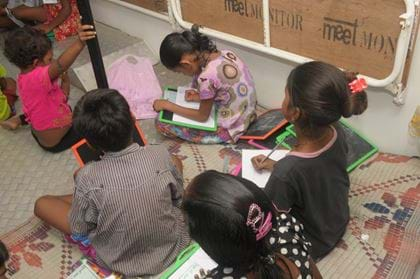Tackling Human Trafficking and Exploitation Together

December 2 is the International Day for the Abolition of Slavery – a day marking the UN’s 1949 convention against trafficking and exploitation.
However, this is not a day to mark a historical victory – instead, this is a day to refocus efforts on the current fight against slavery and trafficking. A recent global estimate from the ILO and Walk Free Foundation found that more than 40 million people worldwide are victims of these crimes. It is for these people, who have had their liberty robbed and their dignity undermined, that I am spearheading the UK’s efforts to tackle these horrendous practices.
The work of organisations such as the British Asian Trust is vital if we are to eradicate this problem successfully. By investing in solutions at source, the Trust empowers communities and builds resilience against the issue of child trafficking in South Asia.
The United Nations Office on Drugs and Crime has stated that one third of all human trafficking victims are children. As such, I am pleased to see the Trust’s work focusing on ensuring that children are not exposed to the violence, exploitation and abuse of human trafficking.
The British Asian Trust is investing in solutions that address the root causes of trafficking and drives programmes that are collaborative, innovative, scalable, and grounded in research-based evidence. A key focus of the Trust’s work focuses on working with business to tackle child labour trafficking in South Asia. This business engagement work involves a united approach from business, government, and civil society that aims to choke the demand for child labour and promote the creation of child labour-free goods.
This kind of work aligns with the objectives of the UK Modern Slavery Act; a bold and innovative law that sends a strong message to businesses that they have a responsibility and duty to ensure their supply chains are free from forced labour and trafficking.
Section 54 of the Act requires companies to report on what they’re doing to tackle these issues within their supply chains in the UK and globally. This new focus by companies on their global supply chains may help to raise workforce standards far beyond the UK’s own shores, supporting better conditions for workers worldwide.
Ending these crimes is a complex task, stretching across every section of society and every country worldwide. But it is a task which must be done, and with the good work of the British Asian Trust among many others, I am confident that we will, eventually, eradicate these heinous crimes for good.
Kevin Hyland OBE, Independent Anti-Slavery Commissioner
Kevin Hyland OBE is the United Kingdom’s first Independent Anti-Slavery Commissioner, leading efforts to tackle modern slavery and human trafficking. He promotes best practice and drives crucial improvement both in the UK and internationally.
